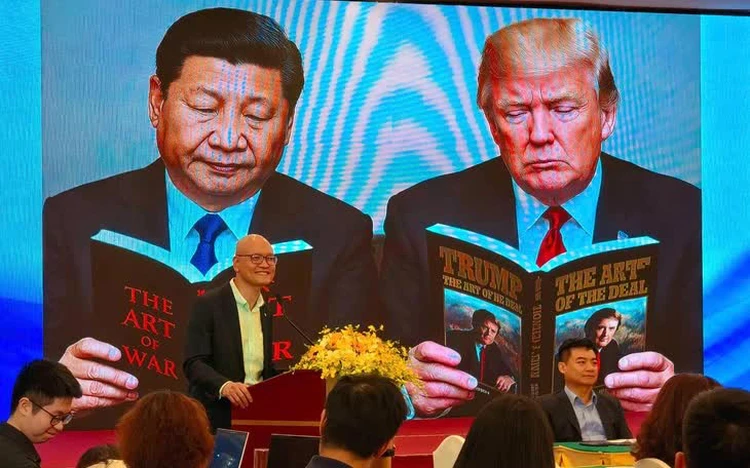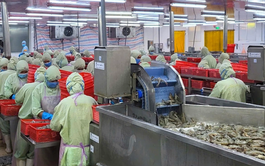
Dr. Tran Ngoc Anh (L, standing), a professor at Indiana University in the U.S., speaks at a seminar on global trade and digital technology trends held in Ho Chi Minh City, Vietnam, June 3, 2025. Photo: Nhat Xuan / Tuoi Tre
Dr. Anh shared this insight during the seminar titled 'Global Trade and Digital Technology Trends Update,' held in Ho Chi Minh City on Tuesday by the city’s Investment and Trade Promotion Center.
He highlighted that the U.S.'s firm stance toward China, particularly in high-tech sectors, is prompting a shift in supply chains away from China.
In this context, Vietnam is considered a top alternative destination as corporations seek new partners to diversify production.
While acknowledging the potential risk of Vietnam facing higher reciprocal tariffs from the U.S., the professor pointed out that these tariffs are still lower than those imposed on China, allowing Vietnam to maintain a relatively competitive edge in export markets.
He also emphasized the limitations of the U.S. bringing supply chains back domestically.
The U.S. is short of manufacturing infrastructure while labor costs are high. Producers of basic items like toys, wood, and textiles find it challenging to operate domestically due to high inflation risks.
However, entering the U.S. market is becoming increasingly complex because of stringent legal procedures.
Vietnamese enterprises need to collaborate closely with associations and specialized legal entities to receive advice and support in the export process, he advised.
Vu Tu Thanh, deputy regional managing director and Vietnam chief representative for the U.S.-ASEAN Business Council, emphasized that Vietnam has transitioned from a passive observer to a proactive participant in responding to shifts in U.S. trade policies.
Since mid-2024, Vietnam has developed response scenarios in case of the re-election of U.S. Presdient Donald Trump, while proactively conveying a message of mutually beneficial cooperation.
With a high level of economic openness and 17 signed free trade agreements, Vietnam possesses a solid foundation to expand exports, attract foreign direct investment, and strengthen connections in the global value chain, Thanh explained.
A notable development, according to Thanh, is the U.S. Customs and Border Protection (CBP) agency launching its first permanent office in Vietnam.
Previously, CBP had offices in only three locations in East Asia: South Korea, Thailand, and Singapore.
“This unprecedented move reflects Vietnam's increasingly important role in the global trade chain, as well as the Vietnam-U.S. bilateral economic relationship,” Thanh emphasized.
He also warned that CBP is intensifying investigations and will impose strict sanctions on trade fraud, especially concerning goods originating from China but falsely labeled as Vietnamese.
In response to this risk, Thanh highlighted that Vietnamese enterprises have begun implementing comprehensive risk control measures, including completing origin certification, enhancing quality standards, and improving traceability capabilities.



Max: 1500 characters
There are no comments yet. Be the first to comment.